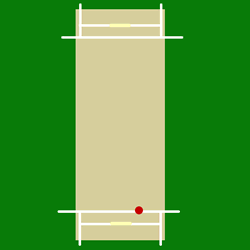Left-arm unorthodox spin
| Bowling techniques | |
|---|---|
| Types | |
| Fast | |
| Spin | |
| Deliveries | |
| Fast | |
| Spin | |
| Other | |
| Actions | |
| Usual | Overarm |
| Other | |
| Illegal techniques | |

Left-arm unorthodox spin also known as slow left arm chinaman, is a type of left arm wrist off spin bowling in the sport of cricket. Left-arm unorthodox spin bowlers use wrist spin to spin the ball, and make it deviate, or "turn" from left to right after pitching. The direction of turn is the same as that of a traditional right-handed off spin bowler; however, the ball will usually turn more sharply due to the spin being imparted predominantly by the wrist.
Some left-arm unorthodox bowlers also bowl the equivalent of a "googly", (or "wrong'un"), which turns from right to left on the pitch. The ball turns away from the right-handed batsman, as if the bowler were an orthodox left-arm spinner.
Origin of the term chinaman
In cricketing parlance, the word "chinaman" is used to describe the stock delivery of a left-arm "unorthodox" spin bowler (though some reserve it for the googly delivery ). The origin of the term is uncertain. One version relates to a Test match played between England and the West Indies at Old Trafford in 1933. Ellis "Puss" Achong, a player of Chinese origin, was a left-arm orthodox spinner, playing for the West Indies. He had Walter Robins stumped off a surprise delivery that spun into the right-hander from outside the off stump. As he walked back to the pavilion, Robins reportedly said to the umpire, "fancy being done by a bloody Chinaman!",[1] leading to the popularity of the term in England, and subsequently, in the rest of the world.
Among noted players who have bowled the chinaman is Denis Compton, who specialised in the delivery when bowling. Although better known for fast bowling and orthodox slow left arm, Garfield Sobers could also use the chinaman to good effect. In modern day, Brad Hogg is a natural spinner of the ball who popularized chinaman and has one of the most well-disguised wrong-un's. He won Australia two World Cups, picking up 13 wickets in 2003 World Cup and 21 wickets in 2007 World Cup.
References
- Cricket and Race by Jack Williams ISBN 1-85973-309-3
- Wisden, 1968 and 1987 editions
External links
- Player profile: Puss Achong from ESPNcricinfo
- Player profile: Kuldeep Yadav from ESPNcricinfo
- Cricinfo - The Original Chinaman
- Cricinfo - Leggie in the Mirror